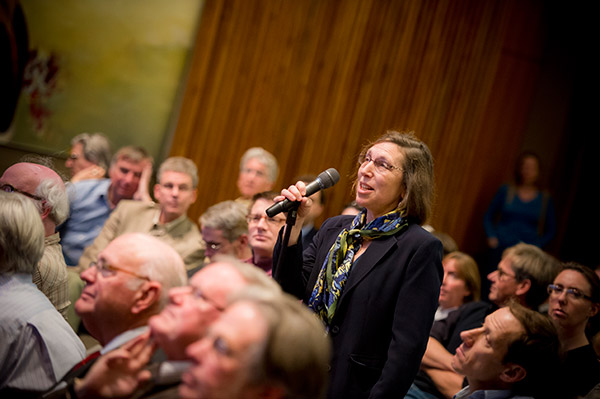Scripps Institution of Oceanography Community Gathers for Strategic Planning Town Hall

The birthplace of UC San Diego was the site of the most recent campus strategic planning town hall when Chancellor Pradeep Khosla met with the Scripps Institution of Oceanography community on Jan. 18. Town hall participants included Scripps faculty, staff and students. Also in attendance was Walter Munk, who joined the Institution as its first graduate student in 1947, former Director Charles Kennel, along with members of the Scripps Advisory Council.
In a discussion led by Interim Director Catherine Constable, who invited her colleagues “to brainstorm a strategic plan with a slight Scripps flavor,” faculty, students, and staff urged the Chancellor to expand alliances between their researchers and “upper-campus” faculty. They described how Scripps field data on atmospheric and ocean conditions can accelerate innovations in Engineering, Biological Sciences, Physical Sciences, and Social Sciences. And they emphasized how such cross-campus scholarly advances could revolutionize public policies for protecting the environment and mitigating climate-related disasters.
Chancellor Khosla paid tribute to Scripps’ historic role as “the seed of what we think of as UC San Diego” and added, “We need to come together as a community to define our shared aspirations and define a strategy to move forward.”
To that end, the session focused on ways that Scripps can build on its global leadership in the earth sciences and strengthen UC San Diego’s institutional impact. Feedback included:
- Technological advances in satellite observation and computer modeling have increased rather than lessened the value of data from Scripps sea-going research expeditions.
- Staff technicians and engineers who sustain Scripps field research have exceptional skills. Their contributions should be recognized and rewarded, and their salaries should not hinge on soft money from senior scientists who are facing retirement.
- Faculty should be given incentives to develop interdisciplinary educational programs based on cutting-edge research.
- Recruitment of top graduate applicants and career placement for new Ph.D.s should be tactical and vigorous.
- Undergraduates should be made aware of Scripps’ legacy as an environmental sciences pioneer and should be encouraged to take advantage of the learning opportunities available there.
Future stakeholder group town hall meetings will be held for health care staff and the external community.
